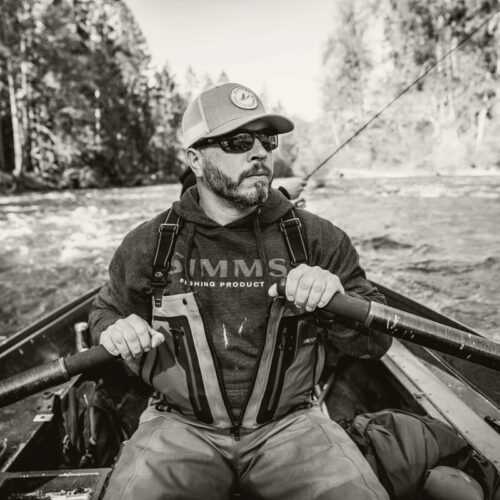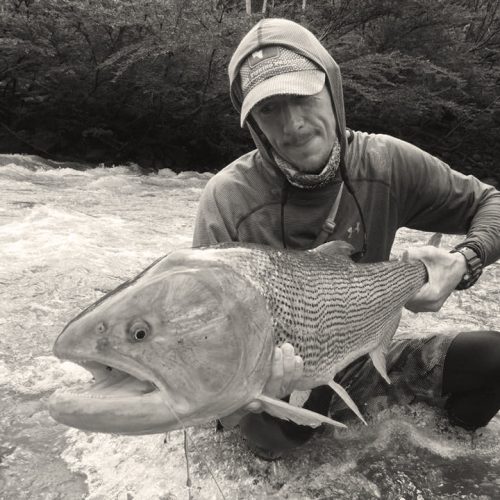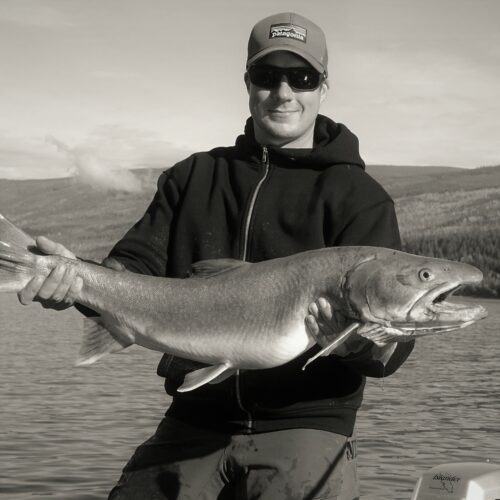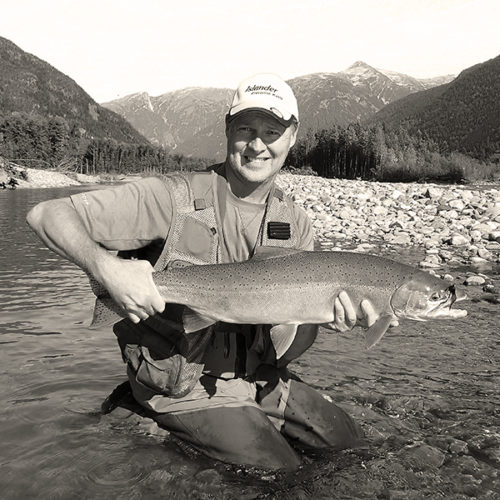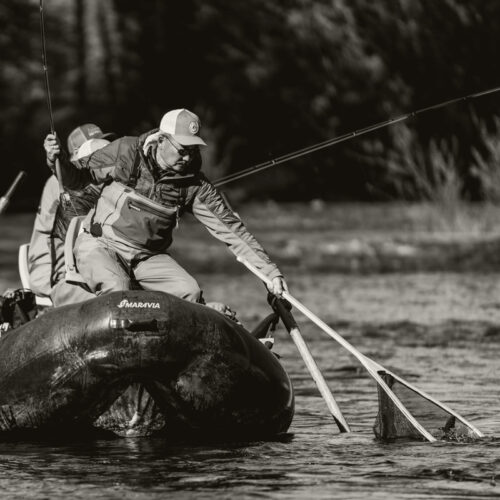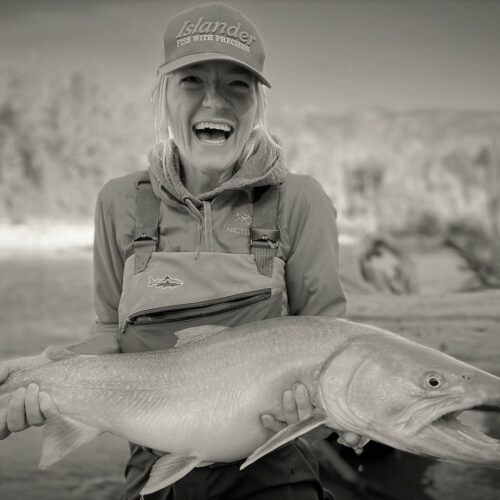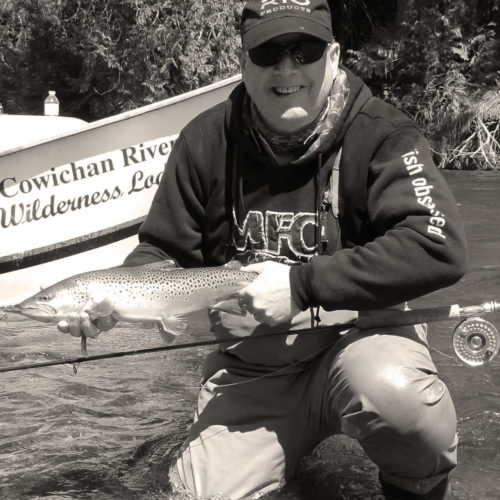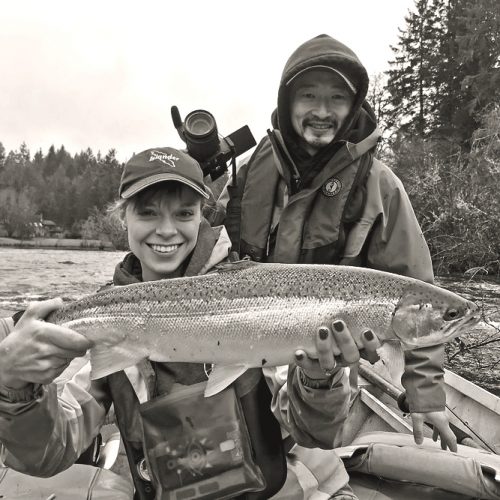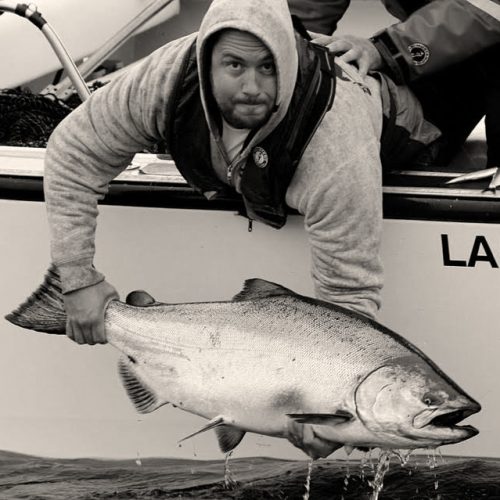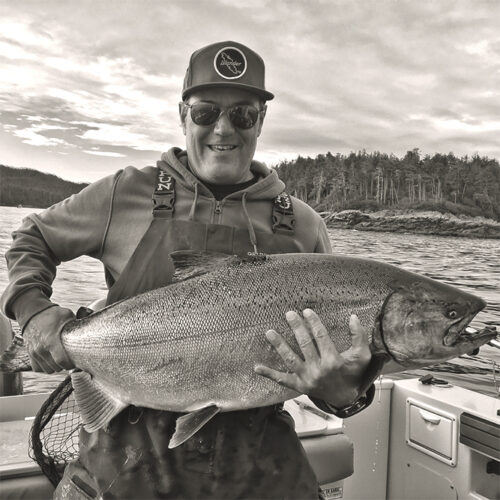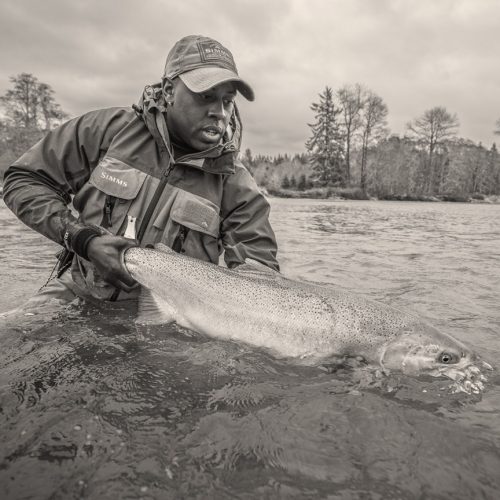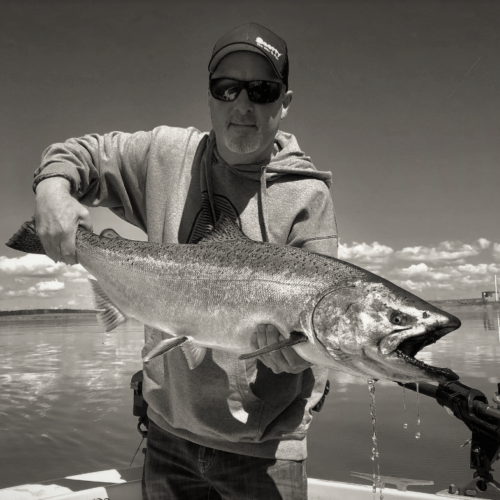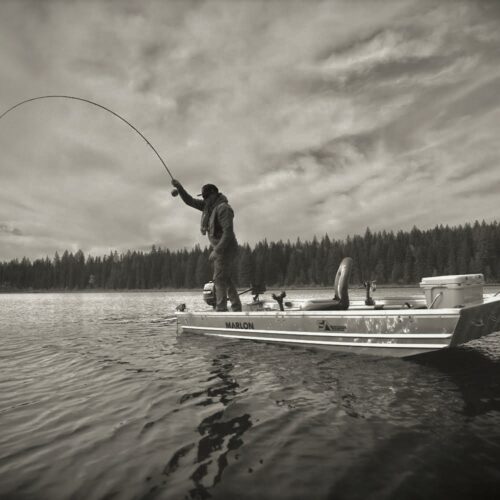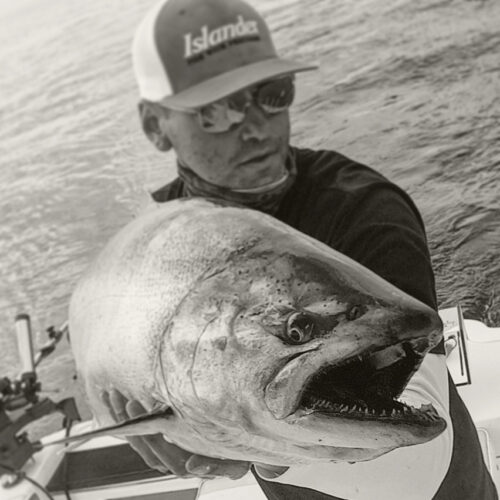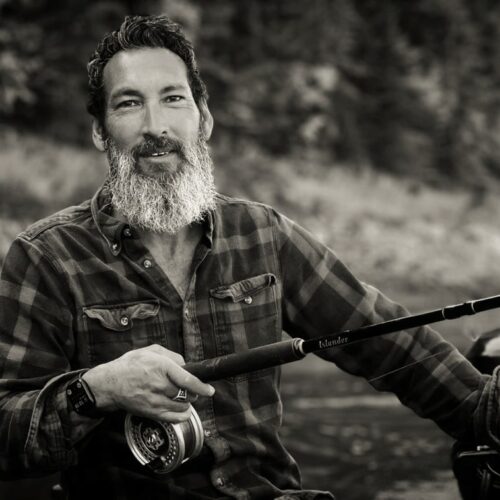FIELD TEAM
Nelson Karger
For some it comes from family, for others it’s friends, for Nelson Karger, the passion for fishing came from within. Ever since that first rainbow trout took the bait near Smithers, British Columbia, it was Nelson who was hooked.
Since that day he hasn’t looked back. From the freedom to explore that came with a driver’s license to summers guiding in Haida Gwaii to buying his first boat and launching his guiding business, it’s been non-stop pursuit of the best fishing B.C. has to offer.
What’s the best memory that fishing has given you?
When I caught my first coho salmon out of a canoe at age 13. I was by myself and it towed me around the lake for a few minutes!
You guide in both salt and freshwater; how does the experience differ?
Freshwater is much more relaxing and in touch type of experience. Where I find saltwater is more about catching fish for food.
What’s your personal philosophy towards fishing?
Enjoy every day on the water with an open mind, there is always something new to learn and be lucky that this is what I chose to do!
What’s your favourite local species and your favourite exotic species?
Local: Rainbow trout/steelhead
Exotic: Yellowtail
In 3 words or less describe your fishing
Dream: Dry fly steelhead
Nightmare: Needy ungrateful guests
Reality: Be cool
Jeff Fisher
Since he was a toddler following his dad on the hunt for carp, pike and deep sea species around Southern England, Jeff Fisher has been doing his family name proud. His prolific guiding career has taken him to Northern Manitoba, Northern Saskatchewan, the Northwest Territories, Nunavut, the Yukon, British Columbia and even the jungles of South America.
You’ve guided all across Canada (and beyond) what sets this country’s fishery apart?
That’s easy, the vast amount of cold, clean, fresh water lakes and rivers along with the countless fishing opportunities one has living in or visiting Canada, from coast to coast to everything in between. The fish are plentiful and can obtain world record sizes in the right places and if you’re in the right places at the right time of the year, it doesn’t get dark.
What advice would you give to someone trying to become a full-time guide?
I’d say try and get used to living out of big bags, chasing the seasons, flying a lot and having more patience than you thought you had. There’s a reason why so many do it…It’s a really cool job, your desk has a 360-degree view and every day is different.
In 3 words or less describe your fishing
Dream: We slayed ‘em
Nightmare: The motor’s dead
Reality: We landed 1
Todd Kelly
A true outdoorsman is the best way to describe Todd. When he’s not on the water with a rod and reel in his hands, you’ll find him in the interior mountains of British Columbia pursuing game. From a young age, Todd has had a huge passion for everything outdoors. He jumped at the first opportunity he had at working as a fishing and hunting guide in Northern BC when he graduated high-school. Throughout the years he’s traveled all over the province chasing the next adventure. He now calls the Shuswap home where he spends the majority of his time on the water with his son. The two of them enjoy trolling the big water with downriggers, drift fishing for winter trout, and fly fishing the many stocked mountain lakes.
How did you get into fishing?
Like most, my father was a fisherman and from a young age I wanted to be like him. So, as soon as I was old enough to hold a rod, I was out on the water following his guidance learning to fly fish the many pothole lakes in the West Kootenays.
When did you start to take fishing seriously… Something more than a hobby?
As a child I had a huge passion for the outdoors. So as soon as I graduated from high school, I headed to northern British Columbia and got a job as a fly fishing and hunting guide. I was able to share my love of the outdoors with others. Ever since then, I see fishing not as a hobby but as an essential part of life.
Who was your biggest mentor or inspiration in the fishing world?
Growing up in the late 80s and having a passion for fishing and the outdoors, I spent many Sunday mornings watching Bob Izumi traveling around the country catching fish. I was inspired watching all the wild places he was able to go and I wanted to go to those same places and catch the same fish one day.
What’s the best memory that fishing has given you?
Watching the excitement on my son’s face when he reeled in his first fish.
What’s your personal philosophy towards fishing?
Adventure first! It’s about the wild places fishing takes us and the time spent with like minded people. Catching fish is a bonus.
Do you have a favorite fishing quote?
“Many men go fishing all of their lives without knowing that it is not fish they are after”
-Henry Thoreau
How do we strike a balance between consumptive and conservation fishing? (a big question I know)
I feel we need to respect and protect the last wild fish habitat we have. These wild fish should be catch and release only and we should leave the harvesting to stocked bodies of water. Although, if we remove fishing opportunities from any area, interest in conserving those places will diminish. We also need to change the mindset of fishermen from a successful trip meaning they limited out, to one of enjoying the whole experience including letting fish go.
If you could only fish three patterns for the rest of your life, what would they be and why?
Wooly bugger, Stimulator, and Elk Hair Caddis. They always catch fish.
If you could only fish in one place for the rest of your life, where would it be and why?
Kinbasket Lake. Big mountains, deep clean cold waters, and hungry monsters swimming the depths. Enough said.
In 3 words or less describe your fishing
Dream: Artic Char
Nightmare: No recreational fishing
Reality: Family first
Location:Shuswap
Email :t_kelly8@hotmail.com
Tom Johannesen
It’s amazing how a little positive reinforcement can be the spark that ignites a fire. Tom Johannesen grew up fishing but at the age of 23 he had his first article published in a British Columbia Federation of Fly Fishers (BCFFF) newsletter and something changed.
Since that first article, Tom has been on a mission to master his craft and to share what he has learned with others. With over 200 articles published in magazines like BC Sport Fishing, BC Outdoors, Outdoor Edge, Canadian Fly Fisher, Home Waters, Reel Angler, Western Angler and Island Fisherman, it’s clear that it’s a mission he takes seriously. He also regularly hosts seminars and tutorials at fly clubs and shops in the hopes of lighting that spark in the next generation.
Which of your Islanders sees the most use?
My first Islander LX 3.8 has landed Steelhead on the Dean River, Bonefish in Mexico and Coho in the Queen Charlottes. If the reel could talk it would say it has had a very happy and full filling life so far. The LX 3.8 still makes it to the Dean River ever summer.
You spend a lot of time giving seminars, what’s the biggest piece of advice you give anglers looking to improve their craft?
By far the biggest piece of advice I can give any angler is being properly prepared for each and every outing. This includes checking tides or water conditions and having the right gear to fish those conditions. I always recommend having all your gear ready to go when you arrive on the water. This includes fresh leaders and flies and reels are lubed and ready to go.
If you could only fish in one place for the rest of your life, where would it be and why?
Immediately the Dean River for summer-run Steelhead comes to mind but I’m going with Big Bar Lake in the Cariboo as the lake contains rainbows to ten pounds and all forms of insect life are present to try and imitate. I enjoy fishing this specific body of water as it can be very challenging at times and everyday brings new prospects. As anglers, the more we fish the more we have the desire to be challenged.
In 3 words or less describe your fishing
Dream: prolific hatch
Nightmare: extreme winds
Reality: Relaxing outing
Location:Coquitlam, British Columbia, Canada
Email:tjflyfisher@shaw.ca
Brian Chan
Ichthyologist – it was probably the first and last time Brian Chan’s 4th grade teacher ever got that answer in response to the classic “what do you want to be when you grow up” question however for Brian, this was no novelty. He stayed true to his word and went on to have a 30-year career in managing recreational fisheries in the angler’s paradise that is British Columbia.
Brian’s personal philosophy towards fishing is not to just catch fish but to know why we are catching fish. This has led to extensive study of entomology and hydrology and how they relate to the craft of fly fishing whether that’s presentation, time of day, depth or fly tying.
The knowledge he has accumulated over his 40 years of fly fishing has made him a coveted guide, seminar host, author, and television personality.
Along with long time fishing partner and fellow Islander Field Team member Phil Rowley, Brian has developed a successful DVD series (Conquering Chironomids) and numerous stillwater fly patterns which are available on their website. His contribution to the world of stillwater fly tying was recognized by Fly Tyer magazine with a Lifetime Achievement Award in 2014.
All told, I think his 4th grade teacher would be impressed.
What attracts you to the lakes over other bodies of water?
In large part because of a career managing stillwaters as a fisheries biologist I have had a life long passion for productive stillwaters.
I know you’re a fly guy, but do you dabble in any other tackle like centrepin or mooching?
My youth was spent mooching for salmon in Howe Sound and the east coast of Vancouver Island. I also started steelhead fishing with a centre pin and still enjoy it.
What’s the best memory that fishing has given you?
Tarpon fishing in Cuba, waiting on an ocean flat at first light for the tarpon to leave the mangroves and head back to deep water for the day. For about 2 hours large groups of fish would cruise over the white sand bottomed flat. We intercepted many of those happy fish and the sight fishing was absolutely epic.
In 3 words or less describe your fishing
Dream: watching the indicator go down hard!
Nightmare: climate change affecting the survival of salmonids in interior lakes
Reality: having the continuing opportunity to fish well managed stillwaters in BC
(…three words is too tough)
Location:Kamloops, British Columbia, Canada
Website:www.riseformflyfishing.com
Jennie Sosnowski-Deschamps
Whether it be hucking flies from shore or cruising down river in search for the perfect spot for a troll, you’d be hard pressed to find Jennie and Chad anywhere else besides the Columbia River running through their home of Revelstoke, BC. This dynamic duo can be found doing everything from fly fishing to mooching to ice fishing, usually accompanied by their loyal (and very large) canine companions Chewie and Gina.
How did you get into fishing?
I was introduced to fishing as a kid, we fished with my grandfather on camping trips in AB and BC and with my Grandmother when we’d visit her on Vancouver Island in the summer. She loved to take us out on her boat or take us digging for clams. When my Dad bought a large rural property when we were kids, the first thing he did was build a giant pond and fill it with trout before spending the next 20 years transforming the rest of the property around it in to a rural sanctuary. The dock on this man made lake became my favourite spot to sit with my dog, my book and a fishing rod.
When did you start to take fishing seriously… Something more than a hobby?
It’s hard to say if I take it seriously. I take respecting the fish and the water they live in seriously, but the sport itself is something I strive to not take too seriously, to be honest, I try not to take myself too seriously. I’ve never been a competitive person and the experience of being surrounded by the rhythms of nature and water is something I would never want to lose sight of. To take something seriously, to me, means to take it proudly or solemnly but I like to think I take it with humility and a constant gratitude that I am able to get out there and experience it as much as I do.
Who was your biggest mentor or inspiration in the fishing world?
There are so many people that I’ve looked up to and learned from in this sport, some of my best friends and of course, Chad, growing up on the Columbia, has taught me so much. But, my first would probably have to be my grandfather. He had a huge passion for big game hunting, salmon fishing in BC and fishing in the arctic, he obtained his pilots license in the 1950’s and when he flew himself to NWT in the 1960’s for investment work, he decided to take an extended break from his career and he built, with the help of some locals, his wife, and his business partner, Great Bear Trophy Lake, a fly-in fishing lodge that he managed for many years with his wife, catching fish that I’ve only ever dreamed of seeing in an area that had been truly untouched by the outside world at that point. It was in a time when conservation of species and environment wasn’t something that was regularly talked about or practiced and the world was hardly aware of the consequences of over fishing, let alone climate change. I remember coming across an old newspaper clipping from the 70’s in the Chicago Tribune when I was a young kid in the 80’s where the author had talked about this realization that anglers were stuffing freezers and ice chests and hauling them thousands of miles more to impress their friends than they were after a reasonable amount of food to feed their family. He was blown away by the greed of it all. When the author interviewed my grandpa about the fishing practices he’d seen and practiced in previous years, it was his aware and humble attitude of “we can and should be doing better” from my grandpa that stuck with me all of these years. It made me proud to see this kind of humility in a man who was a legend and a giant in his own right.
What’s the best memory that fishing has given you?
There is no single best memory that fishing has given me, but most of my best memories have been spent fishing. I mean, even our wedding day was spent fishing and it was perfect, but, one of the things that I love the most about fishing is that it’s something I can share with my dogs. I’ve never been drawn to anything the way I’ve been drawn to dogs, since I was a baby, until I found my love for fishing. These two great loves went hand in hand. I think that their best memories with me have been spent on a river, somewhere, waiting for a fish to bite, and that for me, makes them my best memories, too.
What’s your personal philosophy towards fishing?
For me, there are no good or bad fishing days. There are too many variables out of our control that would determine that, and it would drive you crazy if you let it. You can’t plan for everything but you can make the best of just about anything, if i catch a fish that’s ideal. But if I step out of the water, a little lighter than I was the day before, that’s a win, too. If I can walk away having learned something about myself or a fish I might have lost, that’s a good day, too.
Do you have a favourite fishing quote?
I have a few, but most meaningful to me are all written by Jim Harrison.
“Fishing makes us less the hostages to the horrors of making a living.
“You can easily minimize a sport by coming at it with too sharp an angle in the manner of a technocrat. Fishing, however, is a slow grower. You start in your youth and slowly progress to the full meaning of what you experience. Day after day your memories accrete and the fish gather and seem to own their splendor. You are living in the background movie of their lives. Since they exist comfortably within their habitat, you return to the river and think how naturally the river is also your metaphor. Who is good at fishing and who not so good doesn’t generate a proper metaphor.”
And of course “you can never be unhappy in the middle of a big, beautiful river”
How do we strike a balance between consumptive and conservative fishing?
Each of us has a personal responsibility to the rivers and fish we love and frequent, not to literally love these things to death. Even the most well meaning of us are not entirely harmless to our surroundings. Finding that balance first comes from ourselves. We have a responsibility to protect the things we love, educating ourselves and promoting a respect for our fisheries and an awareness for the challenges they face is paramount. I think that journey of finding a balance between “what is enough to feed my family” and “how can I preserve this experience not just for the environment but for future generations to enjoy” will look different on everyone. It’s a personal responsibility to our land and it’s resources that needs to come before ego and greed, or it will never balance out.
If you could only fish three patterns for the rest of your life, what would they be and why?
This is a lot like asking someone their favourite 3 albums of all time. It’s impossible. But if you were to make me I guess I’d say a parachute Adams because it’s a well rounded dry, a pink and white clouser because I caught my first bully on one of those and maybe an egg pattern/indicator as a last ditch if I’m not catching anything I can at least get a pike minnow without fail on one of those. I’m no snob.
If you could only fish in one place for the rest of your life, where would it be and why?
I’ve obviously dreamed of seeing my grandfathers fishing lodge in NWT and catching one of his 60lb lake trout, but there is something so incredibly special about spending your life getting to know a river system, it’s fish, it’s bird species and it’s changing seasons like you know the back of your hand. You form a friendship with that river, a friendship based on respect and gratitude, and that is the ultimate for me. We are lucky enough to live on the Columbia and we could spend every day of the rest of our lives exploring this river and it’s tributaries, and still find places we’ve never experienced before.
In 25 years, you would like to look back and see ______ changes in the fishery and our attitude towards it.
I would obviously like to see continued efforts and progress on conservation and climate change. I think the attitude towards this has changed so much in the last 25 years, it is exciting to imagine how much further it could go if we were all on board. I have deep respect for the people that have dedicated their lives and fishing careers to this aspect.
I am also happy to see that inclusivity and diversity are beginning to take their rightful place as the backbone of this sport. For so long it has been thought of as a white man’s sport, which is ridiculous that it was ever viewed that way when it has such a rich and varied history in cultures across the world, amongst both men and women, since the beginning of time. I am inspired by the amount of female led fishing groups out there, building each other up and supporting each other, no matter your background, sex or upbringing. More of these things, please
In 3 words or less describe your fishing
Dream: Bullies on flies
Nightmare: Oh hello, bear
Reality: Many happy memories
Location:Revelstoke, BC
Brennan Lund
A professional guide, Natural Resource Science major, and former member of the Canadian Junior National Fly Fishing team, Brennan Lund is the definition of an up and comer. Like many, it was family that introduced him to the sport, but since the age of 12, he has been forging his own path with guidance from many of BC’s fishing icons like Matt King, Andy Larkin, Vance Whitley and Todd Oishi.
In the summer you’ll find him guiding in BC’s East Kootenays, a region made famous the world over for its pristine water, genetically pure westslope cutthroat and monstrous bull trout.
What’s your personal philosophy towards fishing?
Utmost respect for the resource. I am a huge catch and release advocate for wild fish stocks, and want to change the way people think about fish. To me there are not a resource, they are a passion, and must be protected.
How do you hope to apply your degree to your work in the future?
Eventually I would love to be able to use my degree in a way to promote fisheries conservation, to help protect our wild fish stocks for the future, and reverse the mistakes made by previous generations.
In 3 words or less describe your fishing
Dream: Healthy wild stocks
Nightmare: No wild trout
Reality: Respect the river
Phil Rowley
One of the many beautiful things about fly fishing is the range of depths into which you can immerse yourself. When you look at Phil Rowley and his career, it’s safe to say he’s off the deep end.
Phil’s interest in fishing started at the age of five when a friend took him in search of coarse species in England and he’s been hooked ever since. As a career, things took off in the mid eighties when he began tying flies commercially for a local fly shop.
Since then, Phil’s passion has passion and skill have only grown to the point where he is a coveted seminar host, the director of marketing and communications at Trout Unlimited Canada, an international fly fishing travel host, the author of three books, and has almost half a million views on his YouTube channel. His instructional DVD series—produced with co-Field Team member Brian Chan and found on their webstore www.stillwaterflyfishingstore.com—is a master class in still-water trout fishing.
While—as far as we know—Phil is not literally underwater with the fish, his resume clearly shows a man fully immersed in the world of fly fishing at a depth few can match. Thankfully he’s happy to share what he’s learned with others and we’re happy he’s on the Islander Team.
Fly tying is obviously one of your passions. What would you tell a tyer looking to make the transition from copying patterns to creating their own?
Learn all you can, take classes even if you can’t see yourself using the flies in the immediate future. If you can attend a fly-fishing show or fishing show spend time watching others tie, especially if there is a fly tying theatre. Take advantage of YouTube, watch and subscribe. Books and DVD’s also provide a wealth of information. Finally, practice. Try to find time on a daily/weekly basis to tie.
If you could only fish three patterns for the rest of your life, what would they be and why?
Tough question, as I target many species on the fly. Based on the premise that I chase trout most often, Balanced Leech (Bruised), Chromie and a Bead Head Hare’s Ear. For the stillwaters I fish primarily these flies simply produce on a consistent basis. These flies also work well on rivers and streams too.
If you could only fish in one place for the rest of your life, where would it be and why?
Lately I have been enjoying the peace and relative solitude of the lakes located in the southwest region of Manitoba. These lakes offer a diversity of species to challenge the fly fisher, rainbow, brown and tiger trout along with a great average size and a remote un-crowded experience.
What’s the best memory that fishing has given you?
So far, travelling to Argentina to chase monster rainbows on Argentina’s Lago Strobel, better known to some as Jurassic Lake.
What’s your personal philosophy towards fishing?
Don’t become biased to one particular species or type of fly-fishing. Learn all you can and target as many different fish as you can on the fly using a variety of methods. The lessons learned and the experiences offer huge dividends enabling you can grow and develop as an angler.
In 3 words or less describe your fishing
Dream: Beautiful warm day, light winds, remote productive clear water lake in a scenic setting, active fish feeding heavily on chironomids.
Nightmare: Fishing elbow to elbow in an ugly place
Reality: Somewhere between dream and nightmare scenarios, windy, cool day, sporadic hatches, moody fish feeding sporadically on a variety of food items.
Fishing With Rod
Gear, fly, centerpin, mooching…There’s a big world of fishing out there and it’s hard for young or new anglers to know where to start. As hosts of the YouTube Channel Fishing with Rod, Rodney Hsiu are doing their best to change that. With family-friendly content, they guide their followers into the sport through their adventures in British Columbia and beyond.
How did you get your start in fishing?
I started fishing at the age of five. My father used to bring me along with him. It wasn’t the actual fishing part that had me interested. I recall being able to run around with a little net while my father patiently waited for the bites. Exploring by the river, pond or seaside got me hooked.
How did you make the transition from “guy crazy about fishing” to “I’m going to start a website”?
When I first moved to Canada in the mid 90’s, it was difficult to find the information I wanted. It quickly became apparent that there wasn’t a reliable resource for anyone who wished to learn how to fish in British Columbia. Being a fishery science student at UBC at the time, I wanted to create a website where new anglers could learn without feeling intimidated. The goal has always been to nurture and educate users so the resource can be enjoyed responsibly.
Did you have any idea what it would become?
I had pretty ambitious goals at the beginning, but it was never my intent to turn this into my career. My original goal was to work for Fisheries and Oceans Canada or similar NGO’s as a field biologist. I never thought Fishing with Rod would become the job that defines me twenty years later.
Why YouTube?
When YouTube was launched in 2006, I quickly recognized its potential and created an account. Since I was young, I have always been fascinated with documentaries and storytelling, so it was only natural for my work to evolve from maintaining a website to creating video content.
I enjoy the creative freedom on an online video platform because it allows me to tell my stories to the audience. Unlike traditional media outlets such as TV, the content on YouTube can be seen anywhere at any given time therefore it has allowed me to reach a much bigger audience than it otherwise would.
In 20 years, what would you like to say you’ve accomplished through Fishing with Rod?
Rod: In twenty years from now, I’d like to see that our work has influenced how fisheries are being managed and enjoyed. I want to see more women being inspired by Kitty’s work on Fishing with Rod so we have more female anglers out there.
In 3 words or less, describe your fishing:
Dream:
Yellowtail kingfish
Nightmare:
Lost at sea
Reality:
Not enough time
Yos Gladstone
From lakes to oceans to creeks to rivers, British Columbia’s fisheries are as diverse as they come. Yos Gladstone knows this better than anyone. Since he was a small boy growing up in the Chilcotin region, he has been exploring all that B.C. has to offer.
These days when he isn’t guiding in Haida Gwaii, the Lower Mainland, or the Skeena region himself, he’s helping others connect to the B.C.’s fisheries through his booking agency Chromer Sport fishing. Whether it’s trolling up 50lb kings, swinging for double digit steelhead, or dry fly fishing for rainbows and browns, Yos has been there, done that and can help you do the same.
How did you get into fishing?
My mom and dad ran a small resort near Gold Bridge BC and I was always fishing the local lakes of the southern Chilcotin region. It wasn’t something that I did with my parents, just was out there solo getting after it, the challenge of it was what I enjoyed then, and what’s kept me coming back for more after all these years.
When did you start to take fishing seriously… Something more than a hobby?
Kathy and Malcom Ruddick of Ruddick’s Fly Shop, then of Burnaby, were the first people to extend some faith in me and gave me a job at the shop. I was probably a horrible salesperson—only 14 or 15 years old—but I was just so happy to be surrounded by all the fishing gear and a whole new level knowledge that I suddenly had access to.
In 1997 I spend my first year on the coast, working at a lodge in Rivers Inlet, I’ve been on the coast of BC guiding every year since. It was in 1999 when I moved to Whistler I started freshwater guiding. Brian Niska who owned Whistler Fly Fishing at the time granted me the opportunity and I spent many years guiding for him in the Sea to Sky before starting my own business.
Tell us a bit about your guiding and Chromer. What inspired you to start the business?
I started Chromer Sport Fishing in 2006. I thought it was going to be easy, that I’d start a business selling fishing trips for all the lodges and guides that I knew and that the phone would just ring and people would send me their money. Young and naive I went for it and spent the first few years struggling to learn the business.
Much effort later Chromer now represents a variety of top-quality freshwater and saltwater lodges, guides and charter companies throughout BC. We are a fully licensed travel agency, but just focused on fishing in BC, nothing else!
When I moved to North Vancouver from Whistler I started my own guiding company, focused on the year-round fishing opportunities in the Sea to Sky region. I’ve been lucky to have an excellent crew of guides working with me, offering trips from Vancouver, Squamish and Whistler. We have people from all over the world fish with us, with lots of them fly fishing for the first time. It’s a fun job in a beautiful part of the world, chasing salmon, trout and steelhead on the wild rivers of BC’s southern coast.
While anglers are united by a common passion, there are different subcultures in the fishing world. For example, saltwater salmon anglers and trout fly fishermen often have different philosophies towards their pursuit. With your diverse guiding, you’ve got a foot firmly in both worlds. What do you see as the similarities and the differences between these “worlds”?
The similarities are simple, people enjoy the challenge of fishing, they enjoy the camaraderie of fishing and the definitely enjoy the aspects of the sport that bring them outside, putting them into nature and wild surroundings. Everyone that fishes also has a little bit of gambler in them, maybe not with money, but with their time, they’re willing to spend it, see what’ll happen. That’s why we spend the extra hour out there, or bushwhack just a little further, they’re all a gamble to see if it will pay off with a fish or a special experience on the day. I don’t see too many differences between the two “worlds”, but fishing is so multifaceted that an accomplished trout angler would feel completely out of place in a saltwater salmon fishing scenario and vice versa. The different styles of fishing are complex, they education and experience making them successful is apples and oranges.
What advice would you give to someone trying to become a full-time guide?
It’s a wonderful job if you like to fish and if you like being around people. The standing joke it, “it would be a great job if it wasn’t for the clients”, but that’s just being funny. The people you get to meet and spend time with is one of the most enjoyable aspects of this kind of work. The three most important things I could tell someone are; have a willingness to learn, have a willingness to be humble and have a willingness to work.
A willingness to learn will open doors to you, senior guides and anglers are more willing to divulge their knowledge if young guides listen and want to know.
A willingness to be humble is sometimes hard as a new guide makes their way in the world, but remember nobody likes a bragger. Whatever you think you’ve done good, the senior guides have done better and more than you, so be humble in your work with other guides and clients.
The willingness to work is what makes or breaks good guides, with a lifetime of long hours ahead of you if you’re trying to become a full-time guide. You get up early, you go to bed late, you have multiple responsibilities all day long. One has to pace themselves, ensuring clients on the last day of the season get the same experience and energy level as the ones on the first day. That’s not always easy to do, but if you want to be a full-time guide remember you’re going to work harder and longer than anything you’ve done before.
If you could only fish in one place for the rest of your life, where would it be?
That’s a tough one. There’s a lot of places I’d like to go, but within the places I’ve fished it’d probably have to be northern British Columbia during steelhead season. I love everything about that area, the wild space of it all and the style of swung fly steelhead fishing. Most of all I just really like the area, every time I cruise into the Bulkley River Valley or drive through the Kispiox Reserve I just realize how lucky we are to live in BC and have this wild fishery still.
What’s the best memory that fishing has given you?
Countless, there’s not a sheet of paper long enough to record all the ‘best’ memories, there’s too many. Looking back at 25+ years of fishing and 20 years of guiding its pretty amazing to think of all the crazy sh!t that’s happened, all the good times, all the once-in-a-lifetime scenarios that you’ll only ever get to see once and all the friendships that have been formed through the love of fishing.
That’s probably the best memory, and it’s not really a memory, because it carries on, but that fact that I’ve made so so so many friends through guiding and fishing. All my best buddies are because we’ve fished or guided together, the godfather of our little girl, has been one of my best fishing buds for years.
People always ask about the big fish you’ve caught or guided, I remember most of them, not all, but those are pretty cool memories of getting to hang on to a really big fish for a few seconds. I do however remember all the super slabs that we’ve lost after a fight. Not sure if those are best memories or worst memories but I can remember some pretty epic battles that have finished in the fish’s favour, which is pretty cool too.
In 3 words or less describe your fishing
Dream: just some sun
Nightmare: cold wet rainy
Reality: refer to nightmare! Ha!
Tim Milne
For years, you could find Tim chasing first descents up and down the coast of British Columbia as a producer for a back country skiing show. Eventually he realized that the best footage wasn’t at the top of the mountains, but in the ocean beneath them.
That was a decade ago, and since then Tim Milne has been exploring every shoal, reef, and inlet British Columbia has to offer on his show Big Coast. Countless tyees and innumerable stories later, Tim continues to show the world what makes our home waters in British Columbia so special.
How did you get into fishing?
I grew up on a lake in Northern Ontario with a dock in my backyard. I remember my dad making me cast into a bucket for weeks before he’d let me “try” the lake. We could catch bass, pike and musky right there and rainbow and lake trout a short trip away!
When did you start to take fishing seriously… Something more than a hobby?
Started doing bass tournaments when I was 12 or 13 and fished bass tourneys right through my teenage years. Fishing really got serious when I married a girl from Delta who’s old man loved salmon…and I was hooked on fishing the Pacific for Chinook!
It’s been over 10 years now since Big Coast first aired—how did it come about?
Big Coast started with our final heli-ski expedition after 20 years of ski and snowboard production. We had a 110-foot boat out of Bella Coola with a Bell 407 helicopter and we were nailing first descents all over the Central Coast. That same big boat was a salmon fishing operation in Hakai in summer…so we just decided to shoot a couple fishing shows. That was it!
With your show, you concentrate on the spectacular opportunities on the West Coast of BC but what other destinations have you had the chance to fish?
This past spring I fished Florida, Bahamas, Playa del Carmen and Cozumel which was all cool. I’ve fished marlin and tuna in Baja most years as a break from NorthWest rain!
If you could only fish in one place for the rest of your life, where would it be?
British Columbia West Coast…but can’t be more specific!
What’s the best memory that fishing has given you?
A lifetime of good times with my father, my boys and all my fishing buddies…there’s so many best memories I couldn’t pick one.
In 3 words or less describe your fishing…
Dream: Sixty Pound Chinook
Nightmare: Dwindling Fish Stocks
Reality: All In
Lael Johnson
It’s not often a catfish catching kid from Kansas matures into a steelhead fanatic living in the Pacific Northwest but Lael Johnson has always been one to make his own way.
His journey to Washington took him all across the country, but since landing in the Seattle area he has matured into one of the Olympic Peninsula’s most sought after guides and his journey isn’t over yet.
How did you get into fishing?
I began fishing at the age of 3 under the tutelage of my father pursuing crappie, bass, gar, and catfish in Kansas. By the time I was 8, waiting on his work schedule to cooperate with my need to feel the tug was not an option. Throughout high school and the early years of my career as a Traveling Surgical Technologist my passion grew—my $60 Rapala bass rod saw a lot of weekend action in the Midwest!
When did you start to take fishing seriously… Something more than a hobby?
After a contract in Illinois ended, I landed a position at the Seattle Children’s Hospital and I moved to the area. A buddy asked me if I wanted to go salmon fishing and I replied: “where do I sign up!” We ventured to a favorite fishing ground for pink salmon and the very first fish I hooked broke my favorite rod in half.
Long story short, this is the exact day I became aggressively serious about fishing and why I do as much as I can for anyone I guide. Fishing for me is a passion, savior, and love. To spark an interest in fishing like that in others while seeing that moment happen from a catch you facilitated is one of the greatest joys I have today.
You’ve taken an interesting career path to professional guiding. Tell us about that journey.
My path into professional guiding started in 2013 after I had gained a bit of attention through social media for consistent catching and photography. I would show my co-workers what they had missed on Facebook or Instagram, and tell them of my adventures.
After seeing these photos and stories, medical professionals I had worked with in the past were willing to give me a chance to be their guide and prove to them I had what it takes. The opportunity was all I needed.
Once word had spread throughout the various hospital systems that I was the “GO-TO” guide, many doctors, nurses, and medical device representatives started filling my dates. I now full-time guide 11 months out of the year and still work as a surgical technologist when the rivers I guide close for fish spawning.
Where do you see Fly Gyde going forward?
I am currently working on guiding in 4 different locations chasing fish with a rod and a lens. Being involved with Islander who supports anglers like us is a stepping stone towards that goal.
Washington’s Olympic Peninsula offers a spectacular wilderness experience… Unfortunately, that’s not really the world’s best kept secret. What’s your key to getting away from the crowds?
Yes, the all too busy Olympic Peninsula. My key to staying away from the crowds is to make the fishing report instead of hearing about it. Then—when the fishing is good—keep it tight-lipped. Not immediately blowing up your success on the internet in search of fame helps me fend off some of the guide chasers.
Also, being organized and prepared for each person that I have on board ahead of time makes the day more pleasurable for those involved and lets me be first to the fish. Fish that have been cast to all day don’t want to bite, so being the guy that gets to an aggressive fish first usually lets my group have a better day—very few, if any, beat me onto the water.
If you could only fish in one place for the rest of your life, where would it be?
I have been lucky to fish in many different landscapes from Patagonia, Canada, and Alaska but if I had to pick one the Skeena River System with its beauty, options, and fish is an easy choice. I’ve never felt so alive dwarfed by mountains and trees that surround you while ankle-deep waiting for the grab of a lifetime.
What’s the best memory that fishing has given you?
A father and son trip I gave to a co-worker before I was guiding. I told them that I wanted to see if I had what it takes to make it as a guide and I would be taking them out for fun. All I asked was for them to judge me truthfully on my performance during the trip.
I took them to the Skagit River which I had never floated, but I did my homework to know where to launch and where to take out. I thought that if I could catch fish on an unknown stream with two anglers that had little to no skill, I’d have a shot at doing this professionally or at least I’m going in the right direction.
At first, things weren’t going as smoothly as I had hoped and all we had to show for a couple of hours were some tangles and a beautiful float down the river. During one of my untangling sessions parked on the side of the bank, I heard some pretty loud splashing in the distance downriver, KINGS! I lit up because it was just the sign I needed—they were there, all I have to do was catch ‘em.
I quickly changed techniques, picked my line and headed for the fish. Not even thirty seconds into having one plug out it got creamed!!! The father pulled the rod out of the holder and desperately tried to hand it to his ten-year-old son, but he wouldn’t take the rod—the kid saw the size of the fish and wanted no part of it!
After fifteen or so minutes we pulled up a perfect specimen of a summer king. At thirty-five or so pounds it made our day very memorable! We continued to fish this honey hole for another couple of hours and landed seven others before we called it a great day.
In 3 words or less describe your fishing…
Dream: 30# Rosy Cheeks
Nightmare: Big Falling Tree
Reality: Four Is Enough
Scotty Richardson
Take a look at any leaderboard from a tournament on the North Shore of Lake Ontario and more often than not, Scotty Richardson’s team will be in the mix for top spot. That success doesn’t come by chance. Whether chartering a group or fishing for himself, Scotty’s boat The Hammer will be on the water every day of the season pounding big fish.
Scotty is also passionate about getting new anglers on the water and showing them the ropes. He regularly invites keen anglers who don’t have a boat of their own to join him on the water and improve their skills.
How did you get into fishing?
My grandfather started me brook trout fishing when I was around 7 years old and I really took a liking to it.
When did you start to take fishing seriously… Something more than a hobby?
In early 2000 I started fishing more often than just the weekends. A couple years went by when I decided I wanted to target these fish out in the lake due to the amount of people fishing the rivers. I purchased a brand new 18 foot Lund fisherman in 2002 and haven’t looked back. I fished my very 1st tournament on Lake Ontario the following year and was amazed at some of the top docs back in the day. I was told the best way to learn the lake was to be an observer in major events so that’s what I did. I was lucky enough to get on some pretty good boats for 2-3 years before venturing out on my own again.
You’re a big tournament angler, what makes tournament fishing different than a regular day on the water?
I like to go out and fun fish all of our local derbies and small events around the lake but nothing beats the feeling when that horn goes for blast off on a Saturday morning in a major tournament.
Why don’t more people take advantage of Lake Ontario’s incredible fishery when it’s right on their doorstep?
We as anglers are blessed at what Lake Ontario has to offer. I sometimes get into conversations with people about fishing and when I show them pictures of some of our catches they are in awe and never realized we have this fishery right in front of them.
In 3 words or less describe your fishing
Dream: That 40 pounder
Nightmare: Losing a tank
Reality: Meat really works
Location:Scarborough, Ontario, Canada
Email:scottysservices@rogers.com
Website:http://scottyssportfishing.ca/
Trevor Tatarczuk
Located in BC’s Cariboo region, Trevor is a stillwater fly fishing fanatic. When he’s not stalking the shoals for trophy rainbow trout on one of the many remote lakes located throughout the region, he’s at the fly tying bench recreating the aquatic samples he’s collected along his journeys. Trevor is an active ambassador in the stillwater fly fishing scene. He has been featured in and collaborated on multiple video productions with FishingBC, Wait4itfilms, Reel West Coast as well as having his stillwater fly patterns published in BC Outdoors Magazine.
How did you get into fishing?
Living in New Westminster as a young boy, my father introduced me to fishing on the banks of the Fraser river. It wasn’t long after that I was digging up my own worms from our compost pile, grabbing my spin cast rod and tackle box, jumping on my BMX and heading to the river by for the day.
When did you start to take fishing seriously… Something more than a hobby?
In 2018, I created an Instagram account to log all fly patterns that I tie. This lead to a sponsorship with Chinook Wind Outfitters fly shop and opened the door for many other opportunities to collaborate with other industry professionals and companies.
Who was your biggest mentor or inspiration in the fishing world?
When I first started my fly fishing journey and before social media I found the Brian Chan, Phil Rowley books & VHS tapes to be my biggest inspiration. There are many others that inspire me today.
What’s the best memory that fishing has given you?
There’s so many fond memories that fishing has provided me. One that comes to mind is catching my first fish on a fly pattern I tied myself. It was a black Doc Spratley.
Which of your Islanders sees the most use?
IR4’s and LX3.6’s
If you could only fish three patterns for the rest of your life, what would they be and why?
Chironomid
Leech
Dragon fly nymph
Chironomids make up the majority of a fish’s diet. Leeches are always a great attractor pattern and can imitate other insects when trying to match the hatch. Dragon fly nymphs are too good of a meal for fish to pass up and the strikes are viscious.
If you could only fish in one place for the rest of your life, where would it be and why?
The Cariboo region of BC. It’s in my backyard and would take a lifetime to explore its vast and diverse water bodies.
Describe your fishing
Dream: Mildly overcast day, slight ripple on the water and indicators consistently dropping
Nightmare: Forgetting my fly box at home
Reality: Adapting to the current conditions and utilizing knowledge gained from past experience to ensure success on the water.
Location:Cariboo, BC
Email:t.tatarczuk@gmail.com
Mat Urbanski
Lake Ontario’s prolific salmon fishery is Ontario’s best kept fishing secret and Mat Urbanski was let in on it at an early age. After a 300 foot run from a North Shore king salmon, it’s hard to go back to bass fishing in Cottage Country.
Mat entered Ontario’s tournament circuit at age 9, and has been racking up the podium finishes. What really sets his fishing apart though has been the fact that he’s been running single-action mooching reels aboard his charter Bite Me Too Sportfishing and in tournaments from the beginning—long before it was cool.
How did you get into fishing?
My love and respect for fishing and all things outdoors is thanks to my family. I wasn’t born with a fishing rod but I had one given to me as soon as I could stand. What began with a bobber and worm on Ontario’s Northern lakes quickly escalated into trolling on the Great Lakes thanks to my Father, Uncle and Grandfather.
When did you start to take fishing seriously… Something more than a hobby?
In the early 90’s when I made my first entry into the Great Salmon Hunt at age 9. That entry, a 29.26lb Chinook was an absolute game changer for my younger self and helped to transform a hobby into something much more.
Who was your biggest mentor or inspiration in the fishing world?
My Father. Not only for introducing me to the fishery but also for educating me in the importance of protecting it for future generations to come.
If you could only fish in one place for the rest of your life, where would it be?
North shore, Lake Ontario.
What’s the best memory that fishing has given you?
I could name a few tournament wins with friends and family that would fit the bill but for me the best memories are made while guiding with first time anglers. Some of my most cherished memories result from getting to share an anglers first Great Lakes experience and getting to be part of their first trophy catch.
With the limited season on Lake Ontario, what do you do in the off-season?
In the off season I’m busy creating digital media and working in post production editing and reliving the footage we captured during the limited open water fishing season. I also chase a few of my favourite species in our local tributaries and have been known to ice fish a little while counting the days until April and the return of our open water Salmon and Trout season.
Have you ever thought about trying a summer out west?
It’s no secret I consider the West to be the Salmon Mecca of the world and after getting to experience the fishery first hand last year, I would seriously consider a summer out west.
What’s your personal philosophy towards fishing?
Fun first! It’s all about the time shared on the water and the experience not the numbers. I’m also a firm believer that its our responsibility as anglers to help preserve the fishery for future generations to enjoy.
What’s your favourite local species and your favourite exotic species?
Favourite local species is the Chinook Salmon hands down, no other freshwater species like it. As for an exotic I’m a Tarpon kind of guy.
In 3 words or less describe your fishing
Dream: Freshwater 40lb King
Nightmare: A mismanaged fishery
Reality: Gotta be good to be lucky
Chad Deschamps
Whether it be hucking flies from shore or cruising down river in search for the perfect spot for a troll, you’d be hard pressed to find Jennie and Chad anywhere else besides the Columbia River running through their home of Revelstoke, BC. This dynamic duo can be found doing everything from fly fishing to mooching to ice fishing, usually accompanied by their loyal (and very large) canine companions Chewie and Gina.
How did you get into fishing?
I was lucky enough to grow up in a family that enjoyed fishing and camping and simply enjoying all aspects of the outdoors.
When did you start to take fishing seriously… Something more than a hobby?
I would have to say; when my father gave me his old Sears model tinny, shortly after I got my drivers license after turning 16. This allowed me to explore the Columbia river, and hit all the places me and my friends would stare at as we were hucking spoons or fly fishing from shore, “imagine having a boat right now?” we could go hit all those pools and runs we couldn’t reach. I was intimidated by the river, I spent countless hours learning it, mapping it and donating tons of tackle to the river in the process. I would memorize the river from high water to low water flows and venture off along the twelve miles of accessible waters in my tinny with my notebook filled with topographical drawings of the river, since I didn’t have a GPS to mark way points, this is how I had to mark the system. I caught and released many powerful bull trout, and I would switch it up for dry flies when the seasonal hatches would happen, this was when I began to study insects and their cycles.
I think I realized at that point, that was the pinnacle that sent fishing from a hobby to something I had much passion for & discovered a whole new love not just for the fishing, but for everything I had been learning about the insects they ate, their habitat, diets, the effects of weather and moon phases had on the different species of fish like rainbow trout to bull trout, carp & other non sport fish, I was catching. I learned that they all have a purpose for the system and why everything balances the waters I fish.
Who was your biggest mentor or inspiration in the fishing world?
My father & grandfather as there were two different generations of people who had different thoughts and meanings of fishing and the techniques used to fish. They both taught me many great values and reasons why fishing was something more than catching fish. Later as I got older, allowing me to show them how to fish, as generations have changed.
What’s the best memory that fishing has given you?
Throughout the years, I have had so many great memories, I wish I had the memory to remember every single fond moment. One that stands out was the day Jennie & I fished & stopped along the river where Jennie & I had a small gathering and got married. Also the people who I have fished with and met through fishing and the fishing industry & now in later years, the opportunities such as doing an episode on Reel West Coast with Brendan Morrison. Having the opportunity to represent amazing companies such as Islander Reels & for Robert Alcock of Gibbs Fishing, Scotty Products, Colin Redisky of Lyman Lures, Tohatsu Outboard Motors through Trevor Simmons of Maple Marine Services & Tracy-Nguyen-Chung of Brown Folks Fishing (a community for BIPOC anglers), now allows me the knowledge to give to others starting out, so they can become successful, when they get out on the water and create their own memories.
What’s your personal philosophy towards fishing?
You won’t catch fish if you don’t get out. For myself, it’s not how many I caught, but how many I released, to sustain a healthy fishery. Creating as many memories while out on that pursuit of catching a fish, sometimes we realize that isn’t what we are really after, it’s that peace within ourselves that we discover as we are out, in our element. That brings so much happiness.
Do you have a favourite fishing quote?
Fishing isn’t a right, it’s a privilege, so treat it as such.
“Perhaps I should not have been a fisherman, he thought. But that was the thing that I was born for.”
-Ernest Hemingway
How do we strike a balance between consumptive and conservative fishing?
Great question. Politically, it can happen with more restrictions on what we can possess as a daily limit for consumption, and simply restrictions on how many fisheries are catch and release.
For myself, I only retain so many for consumption, and practice catch and release as much as I can throughout the season. It’s all individuality, raising awareness to others of conservation & possessing better ethics for conservation.
If you could only fish three patterns for the rest of your life, what would they be and why?
3 is hard, but here we go:
Parachute Adam’s, it’s almost a year round food source for fish.
Olive Scud, almost year round source of food allowing me to use while Stillwater fishing.
Bunny leech for Bull trout after bait fish in lakes and rivers.
If you could only fish in one place for the rest of your life, where would it be and why?
The Columbia River in my hometown Revelstoke. Not only for the great fishing, but also for the views that surround & the wildlife allowing me to photograph while fishing or out, simply exploring.
In 25 years, you would like to look back and see ______ changes in the fishery and our attitude towards it.
Positive changes to the fisheries and more funding to non profit organizations that help maintain stocks. Along with educating conservation and that fishing is for everyone of any race, colour, sex, gender. That will promote an industry of many passionate people with the same mind set of this great sport.
In 3 words or less describe your fishing:
Dream: Healthy fish stocks
Nightmare: Dried up rivers
Reality: Work 5 days
Location:Revelstoke, BC
Email:cdeschamps73@gmail.com


